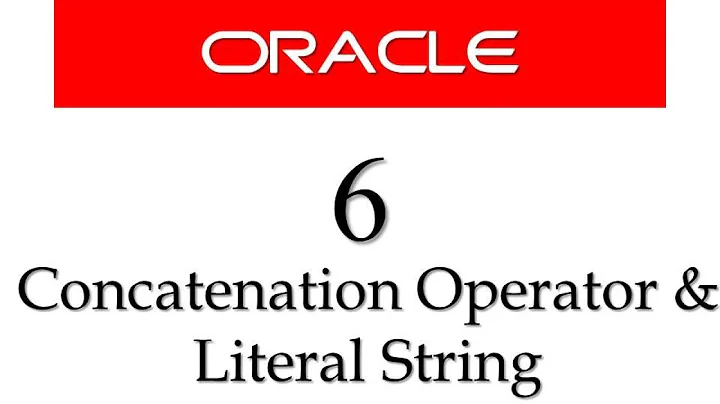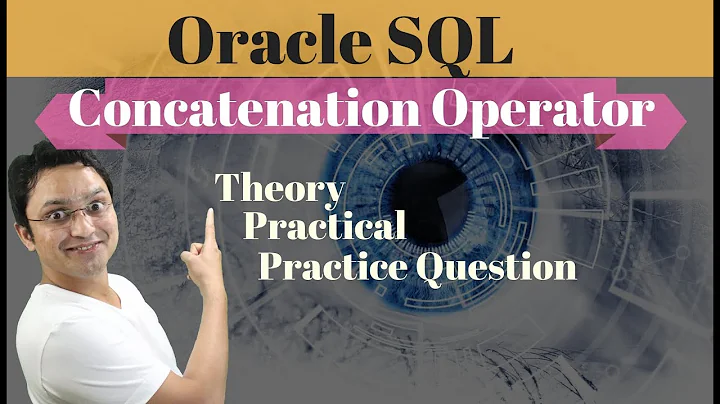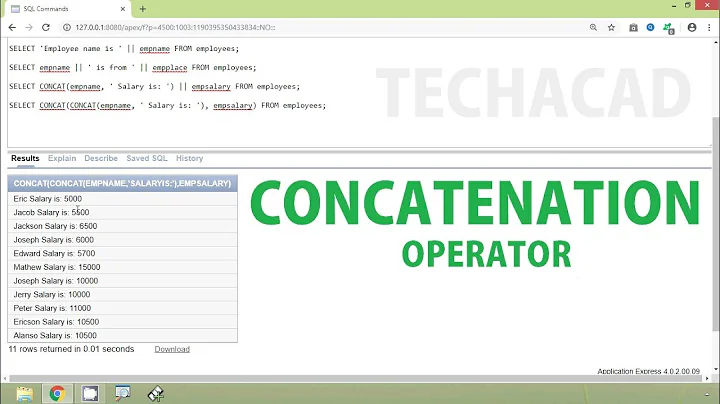What is the string concatenation operator in Oracle?
Solution 1
It is ||, for example:
select 'Mr ' || ename from emp;
The only "interesting" feature I can think of is that 'x' || null returns 'x', not null as you might perhaps expect.
Solution 2
There's also concat, but it doesn't get used much
select concat('a','b') from dual;
Solution 3
I would suggest concat when dealing with 2 strings, and || when those strings are more than 2:
select concat(a,b)
from dual
or
select 'a'||'b'||'c'||'d'
from dual
Solution 4
DECLARE
a VARCHAR2(30);
b VARCHAR2(30);
c VARCHAR2(30);
BEGIN
a := ' Abc ';
b := ' def ';
c := a || b;
DBMS_OUTPUT.PUT_LINE(c);
END;
output:: Abc def
Solution 5
Using CONCAT(CONCAT(,),) worked for me when concatenating more than two strings.
My problem required working with date strings (only) and creating YYYYMMDD from YYYY-MM-DD as follows (i.e. without converting to date format):
CONCAT(CONCAT(SUBSTR(DATECOL,1,4),SUBSTR(DATECOL,6,2)),SUBSTR(DATECOL,9,2)) AS YYYYMMDD
Related videos on Youtube
puzzledbeginner
suave handsome virile programmer wltm progressive dynamic programming language for mutual development and support. contact: AJ at Logos dot Co dot UK
Updated on April 15, 2022Comments
-
puzzledbeginner about 2 years
What is the string concatenation operator in Oracle SQL?
Are there any "interesting" features I should be careful of?
(This seems obvious, but I couldn't find a previous question asking it).
-
Handsome Nerd about 10 years
-
-
 Admin over 15 yearsI'd expect null from a logical operation... not sure I'd ever thought about a string operation.
Admin over 15 yearsI'd expect null from a logical operation... not sure I'd ever thought about a string operation. -
 Tony Andrews over 15 yearsWell of course Oracle treats null and '' as the same, and 'x' || '' = 'x' makes sense. But if you think of null as "undefined" or "unknown" then 'x' || null could be any string beginning with 'x' and so is itself "unknown"!
Tony Andrews over 15 yearsWell of course Oracle treats null and '' as the same, and 'x' || '' = 'x' makes sense. But if you think of null as "undefined" or "unknown" then 'x' || null could be any string beginning with 'x' and so is itself "unknown"! -
Iľja almost 12 years
||in Oracle is not a logical operator, therefore,'x'||nullreturnsx. -
 Tony Andrews almost 12 years@ipip: I am confused - if by "logical operator" you mean operators like
Tony Andrews almost 12 years@ipip: I am confused - if by "logical operator" you mean operators likeAND,NOTetc. then of course||is not a logical operator. But what does that have to due with'x'||nullreturningx?n+nullreturns null, so is+a logical operator? -
jordan about 11 yearsthis is way better than the || symbol. using || is just confusing as per other language's use of ||.
-
afaulconbridge almost 11 yearsI prefer
concat()to||for clarity. -
Yasen almost 11 yearsThis is what I needed. Wanted to use it in expression AND REGEXP_LIKE(CONCAT(
-
beldaz over 10 yearsOracle's handling of null in concatenation is non-standard in that it is different to the SQL92 spec (and Postgres) - see postgresql.org/message-id/[email protected]
-
 lanartri over 10 yearsAgreed for clarity, but || has the advantage to allow more then 2 fields easily
lanartri over 10 yearsAgreed for clarity, but || has the advantage to allow more then 2 fields easily -
lapo over 8 years
CONCATis also compatible with other DBMSes (at least MySQL and Postgres). -
 William Robertson over 8 yearsOdd that it didn't occur to the ANSI SQL committee that anyone might need to concatenate more than two things. (Same goes for the geniuses at Oracle who came up with
William Robertson over 8 yearsOdd that it didn't occur to the ANSI SQL committee that anyone might need to concatenate more than two things. (Same goes for the geniuses at Oracle who came up withnvl().) -
 Matt Gibson about 8 years
Matt Gibson about 8 yearsCONCATis also available in Microsoft SQL Server 2012 and onwards. CONCAT, though nonstandard, is definitely the way to go if you want your code to be portable. (||is the actual ANSI standard operator, though you wouldn't know it by looking at the support for it!) -
abrittaf over 7 yearsUnfortunatly CONCAT() accepts only two arguments. You can concatenate indefinite numbre of strings using ||
-
 Tony Andrews almost 7 yearssorry I realise this was 2 years ago, but why would you prefer
Tony Andrews almost 7 yearssorry I realise this was 2 years ago, but why would you preferconcat(a,b)overa||b? -
 JoshYates1980 over 6 years|| shorter, more flexible, and simple. Look at his select statement.
JoshYates1980 over 6 years|| shorter, more flexible, and simple. Look at his select statement.






